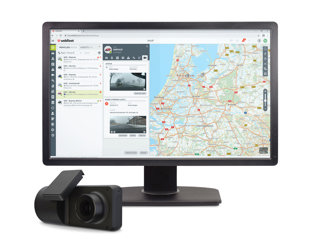Derek Bryan, EMEA vice president at Verizon Connect
Despite much of the global transport industry grinding to a halt as the COVID-19 pandemic shook our planet, fleet-based businesses were more important than ever.
Supply chains still needed to be fulfilled, deliveries made, and goods hauled cross-country – the pandemic shone a light on the necessity of these essential workers.
Perhaps because of the increased demand on fleet-based businesses, a quarter of commercial drivers are now breaking road safety regulations, with many spending over 4.5 hours at the wheel without taking their mandated 45 minute break, according to Verizon Connect’s new Fleet Manager Survey 2020.
This represents a 14% increase in drivers failing to take appropriate rest breaks when compared to a similar study conducted by Verizon 2019.
What’s more, only 15% of fleet managers said their vehicles hadn’t been involved in an accident over the past 12 months, with fatigue ranking as the primary cause for 15% of accidents, second only to speeding at 17%.
So much more than GPS: The rise of vehicle telematics
Increased competitiveness and higher expectations of the industry are prompting fleet managers to explore more innovative, technology-driven ways to increase fleet efficiency, while ensuring driver safety and wellbeing.
The integration of more sophisticated telematics is helping address this need, providing a critical line of sight between fleet managers and drivers, as well as providing a myriad of other benefits including lower maintenance and fuel costs, and a reduction in unauthorised vehicle use.
There is no limit to the potential application of telematics, yet for fleet-based businesses, there still exists a misconception that vehicle telematics doesn’t extend beyond a simple GPS location tracker.
When it comes to driver fatigue and mandated rest stops, telematics help fleet managers monitor driver activity, allowing for automated or manual prompts for drivers to stop and take a break.
Verizon’s research shows driver fatigue is ranked in the top three driver safety concerns of fleet managers – highlighting the important role telematics can play in maintaining driver wellbeing and preventing accidents.
According to fleet managers, accidents account for 4.3 working days lost every year.
This is another area where telematics help plug an essential gap, pinpointing vehicle speed and tracking journeys.
This allows fleet managers and drivers to map out more efficient routes, avoiding heavy traffic zones or sections with high-accident rates, such as narrow country lanes or stretches of road that regularly suffer from inclement weather conditions.
Importantly, these benefits not only improve the efficiency of drivers and vehicles, but also the fleet managers orchestrating the whole operation.
Verizon’s research shows that compliance related tasks account for 20% of a fleet manager’s working day, including over two hours per week correcting and following up on mistakes in drivers’ tachograph data.
Better integration and application of telematics has the potential to all but completely eradicate this unnecessary added workload.
In return, fleet managers are free to work on more worthwhile, value-add tasks that benefit the entire business.
Striking the perfect balance: Business efficiency and driver safety
The COVID-19 pandemic has thrust into even sharper context how indispensable fleet-based businesses are in keeping our country running, but that can’t come at the expense of driver safety and wellbeing.
And, while this increased pressure is prompting fleet managers to become even smarter, this doesn’t mean cutting corners.
Investment in telematics represents an exciting and long-term solution to the many concerns currently plaguing fleet managers around fleet productivity and cost reduction.
This technology is evolving rapidly and helps fleet managers create the perfect harmony between increased business efficiency and driver safety, allowing fleet-based organisation to reclaim time to channel towards beyond just surviving these difficult times, and towards sustained business growth.





















Login to comment
Comments
No comments have been made yet.